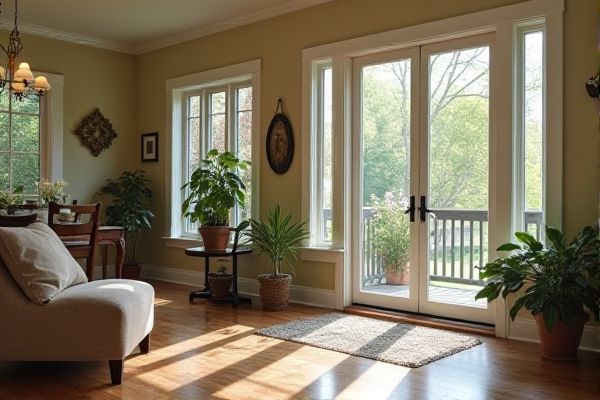
Screened doors provide excellent ventilation and keep insects out, making them ideal for enjoying fresh air without compromising comfort. Glass storm doors offer enhanced insulation and protection against weather while maintaining visibility; explore the rest of the article to determine which option best suits your home's needs.
Table of Comparison
| Feature | Screened Door | Glass Storm Door |
|---|---|---|
| Primary Purpose | Allows airflow, keeps insects out | Protects door, insulates, allows visibility |
| Material | Aluminum or wood frame with mesh screen | Aluminum or vinyl frame with glass panels |
| Visibility | High, clear view through screen | Clear glass, sometimes interchangeable panels |
| Weather Protection | Minimal, mainly insect barrier | Strong protection against rain, wind, cold |
| Ventilation | Excellent airflow | Limited when glass panels are closed |
| Insulation | Low insulation value | Moderate insulation, improves energy efficiency |
| Maintenance | Replace or clean screens periodically | Clean glass, occasional panel or hardware checks |
| Cost | Generally lower | Higher due to materials and installation |
Introduction: Screened Door vs Glass Storm Door
Screened doors provide ventilation and insect protection, making them ideal for warm climates and outdoor spaces. Glass storm doors offer enhanced insulation and weather resistance, improving energy efficiency and home security. Both options serve distinct functional purposes, catering to different environmental needs and homeowner preferences.
Key Differences Between Screened and Glass Storm Doors
Screened doors offer ventilation and insect protection with a mesh panel that allows fresh air to flow through, while glass storm doors provide weather resistance and insulation with clear or tempered glass panels. Your choice depends on whether you prioritize airflow and outdoor enjoyment or enhanced security and energy efficiency. Screened doors are ideal for warm climates, whereas glass storm doors are better suited for colder regions where insulation is essential.
Material and Build Comparison
Screened doors are typically constructed from lightweight aluminum or wood frames with mesh screens designed for ventilation and insect protection, while glass storm doors feature robust aluminum or vinyl frames combined with tempered glass panels to provide enhanced insulation and weather resistance. The mesh in screened doors allows airflow but offers minimal protection against rain or cold, whereas glass storm doors are built to withstand harsh weather conditions, offering durability and energy efficiency. Your choice depends on whether you prioritize ventilation and insect control or improved thermal insulation and protection from the elements.
Ventilation and Airflow Benefits
Screened doors provide superior ventilation by allowing fresh air to flow freely while keeping insects out, making them ideal for promoting natural airflow in warmer climates. Glass storm doors, although offering some ventilation when equipped with operable vents, primarily focus on insulation and weather protection rather than maximizing airflow. Choosing a screened door enhances indoor air quality and energy efficiency by facilitating continuous air exchange without compromising security.
Security Features: Which Offers More Protection?
Glass storm doors generally offer more security protection than screened doors due to their solid glass panels that act as a physical barrier against intruders and harsh weather. Screened doors primarily provide ventilation and insect protection but have weaker structural integrity since they consist mostly of mesh, making them easier to breach. By choosing a glass storm door, you enhance your home's security while maintaining visibility and weather resistance.
Energy Efficiency and Insulation
Glass storm doors provide superior energy efficiency and insulation compared to screened doors due to their solid panels that reduce heat transfer and block drafts. The airtight seal of glass storm doors helps maintain indoor temperatures by minimizing heat loss in winter and heat gain in summer. Screened doors, while offering ventilation, lack the insulation properties necessary to significantly improve a home's energy performance.
Maintenance and Durability
Screened doors require regular cleaning and occasional screen replacement due to exposure to dirt, dust, and weather, but they generally offer good ventilation and pest protection. Glass storm doors provide enhanced durability with their sturdy glass panels, requiring less frequent maintenance but occasional cleaning to prevent streaks and scratches. Your choice depends on whether you prioritize easy upkeep with ventilation or long-lasting protection and insulation.
Aesthetic Appeal and Design Options
Screened doors offer a classic, airy aesthetic ideal for enjoying fresh air while keeping insects out, available in various wood and metal finishes to match your home's style. Glass storm doors provide a sleek, modern appearance with multiple glass panel designs like clear, tinted, or insulated options, enhancing natural light and overall curb appeal. Your choice depends on whether you prioritize an open, breathable look or a polished, weather-resistant design.
Cost Considerations and Value
Screened doors generally cost less upfront than glass storm doors, making them an economical choice for budget-conscious homeowners. While glass storm doors have a higher initial price, they offer added insulation and durability that can increase your home's energy efficiency, providing long-term value. Your decision should weigh the balance between immediate cost savings and the potential for reduced heating and cooling expenses over time.
Choosing the Right Door for Your Home
Screened doors offer excellent ventilation and insect protection, making them ideal for warmer climates and active outdoor spaces. Glass storm doors provide enhanced insulation and weather resistance, improving energy efficiency and safeguarding against harsh weather conditions. Selecting the right door depends on your climate, desired airflow, and priority between natural light versus protection from the elements.
 homyna.com
homyna.com